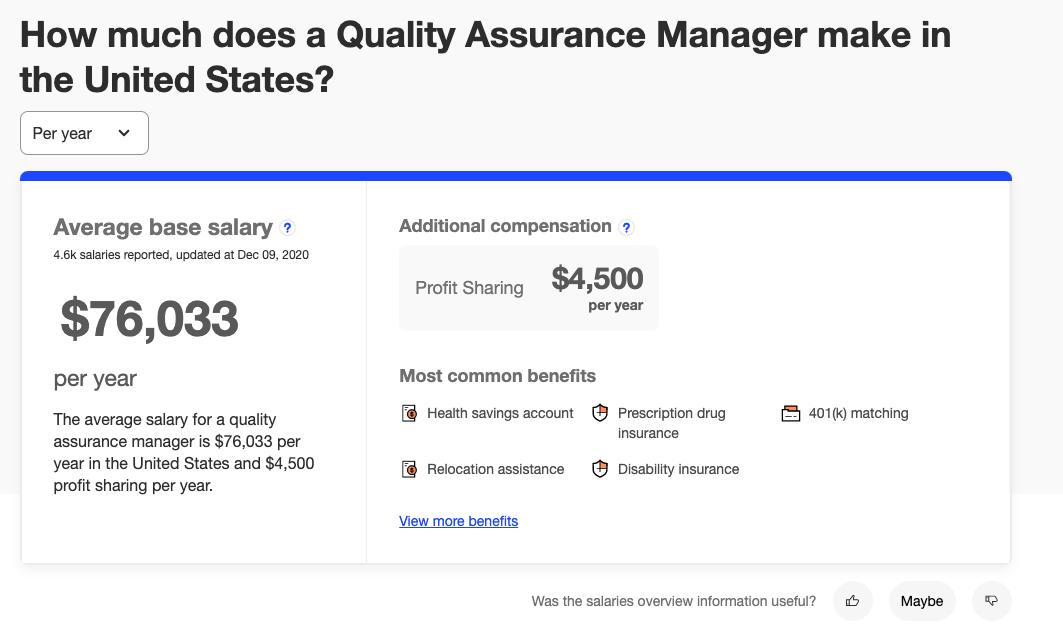
The term” quality assurance” ensures that the product developed meets quality standards set by the organization before it is launched into the market. The roles and responsibilities of qualisty assurance manager plays a pivotal role here. In the case of a substandard product being produced, it is his duty to keep it away from the reach of the customers considering the organization’s reputation.
There will always be a role for humans in the quality assurance process. The evolution of the latest technologies is pushing us to think of what could be done without human intervention. Here is a list of technologies that could impact the quality assurance field are:
- Artificial intelligence
- Machine learning
- The Internet of Things
- Blockchain
- Radiofrequency identification
Quality Assurance Manager- Job Description
The job role of the Quality Assurance Manager is to assist the organizations to formulate quality standards and regulations for employees and for the product produced as well. They must analyze the data gathered and plan accordingly to improve product quality. QA manager will be accountable for identifying the mistakes and inspecting the procedures.
An efficient QA manager should have solid experience in quality control. An ideal candidate for this position should be competent to continue the business life cycle and attain long term success in business.
Also Read: Quality Control Inspector Job Description!
Quality Assurance Manager-Introduction
Quality Assurance Managers play a significant role in ensuring the products meet certain desired regulations and acceptable standards. They formulate and direct the quality assurance programs and policies, and also strive hard to bring the best to the organization.
The quality assurance professionals work towards improving the organization’s efficiency and profit by reducing waste. They must come up with the latest quality controls to maintain company standards.
Roles and Responsibilities of Quality Assurance Manager
The Quality Assurance Manager job roles can be diverse, comprehensive, and depends on which industry you are into as well. Here is a list of common responsibilities performed by them:
- Analyze the data thoroughly to find the areas of growth
- Develop strategies to improve the production process
- Eyeing on the objectives to maximize the profitability of the organization
- Providing training to individuals who handle the product
- Make sure whether the product goes through auditing and testing
- Make sure whether all the legal standards are met and review thoroughly the existing policies and standards
- Review the organization’s process to ensure whether they align with the current policies
- Formulate timely reports and documentation to track progress
- Identify the training requirements to meet the quality standards
- Develop and monitor corrective measures
- Make documentation of internal audits and quality assurance activities
- Plan, conduct, and monitor the test, and inspect the products to ensure their quality
- Take a look at customer complaints
- Analyze the data to find the areas for improvement
Education Qualification and Experience
- A Bachelor’s degree is preferable
- For some managerial/higher positions, having a post-graduate degree or technical degree is much essential
- Having relevant experience in quality inspection, auditing, and testing is an added advantage
- Ample experience in implementing corrective/preventive measures
- Quality assurance knowledge of tools and methodologies
- Certification programs in Six Sigma, Quality Improvement associate, quality auditor, and quality engineer
Emerging Skills of a Quality Assurance Manager
A Quality Assurance Manager should possess varied skills and competencies to progress in the field. These can include:
Domain Expertise
Quality assurance professionals should possess an elementary understanding of the processes of the organization. Having such basic knowledge will help to decide whether the product is up to the mark or not. If the product is of substandard quality, the domain knowledge will help you know where the problem originated.
Human Knowledge
Being competent in this role requires you to have a thorough understanding of how product usage impacts the customers. It’s essential to have a sense of urgency to resolve a problem which can’t be replaced by technology.
Excellent Communication Skills
Having clear verbal communication skills will help you to explain the process and improve it further to attain quality standards. On the other, having proficient written skills is essential to preparing documents as per the project requirement.
Multi-Tasking
Having strong multi-tasking skills will help you to have a better transition between the ongoing work as per the priority without needing to compromise with the standards.
Project Management Skills
Having project management skills is essential while implementing quality assurance protocols and processes. When an organization makes necessary changes to processes like implementing new and complex technologies will impact quality assurance professionals.
Salary and Career Path
Career growth in the quality assurance domain is entirely dependent on the domain and the experience. In the US, a Quality Assurance Manager’s average base salary is $76,936.
Top Companies for Quality Assurance Managers
Some of the top companies for Quality Assurance Managers in the US include; Boeing, Amazon, USAA, General Dynamics Information Technology, Nestle, and more.
Conclusion
To stay competitive in the era of evolving technology, quality assurance professionals need to stay focused on improving their essential skills and competencies to face the challenges that lie ahead of them. To have a progressive career in this domain, the professionals need to reskill and upskill in the latest Six Sigma and Quality Management Certification training programs to stay ahead of the competition and become a global professionals.
Some of the popular quality management certification courses that professionals can take up are:

















